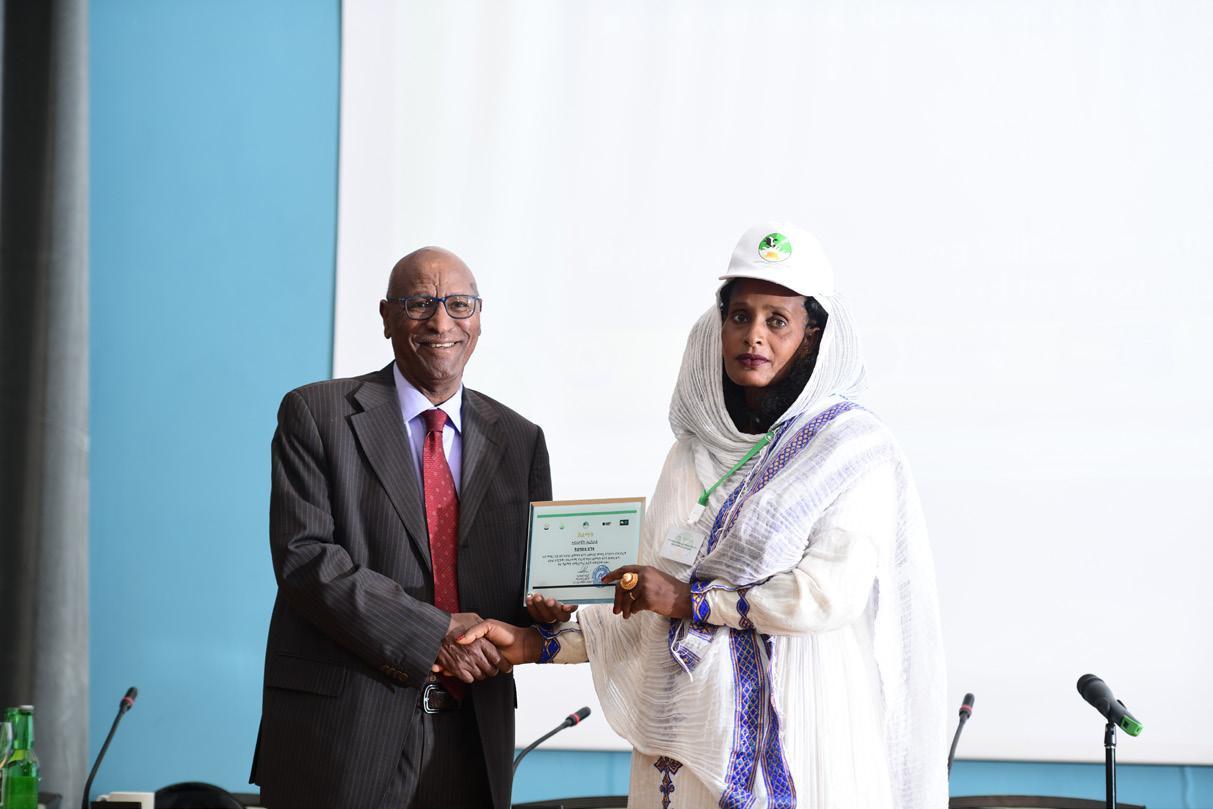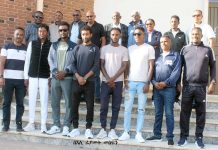Africa-Press – Eritrea. For nearly twenty years, the Tigisti Hintsa family business in Beleza (a village 11 kilometers north-west of Asmara), has been producing and selling milk to the Dairy Farmers Association of the Central Region in Asmara. Owned by Ms. Tigisti, the farm has been producing traditionally spiced butter and other dairy-processed products for the market. Mrs. Tigisti is one of the exemplary farmers who have earned awards for effectively using MoA’s dairy production strategies, showing a remarkable increase in dairy products in a short period, and influencing many other farmers.
Where did your journey with dairy farming first take root?
I was born and raised in Beleza to a family of farmers. My father was a farmer, and so were my siblings. My personal experience as a dairy farmer dates back to 2005. We began by purchasing one cow to provide milk for our children and sell the excess to our neighbors. Through time, however, the one cow we had started reproducing, and our dairy farm started to expand beyond our expectations. Hence, we started selling our dairy production, including milk, traditionally spiced butter, yogurt, and other types of dairy products around our village. Later on, we started selling our products to the Dairy Farmers Association in Asmara. Encouraged by the augmented output we got from the farm, we decided to further expand our farm, building bigger shelters for the cattle and acquiring an even bigger land for the cultivation of greenery forage to feed our increasing number of cattle.
How many cattle do you have, and how do you meet the needs of your livestock?
At the moment, I have about 20 milk cows, the majority of them being Holstein (a type of imported cow) and some are indigenous. They each have their own set of advantages and disadvantages. Imported cows are more productive and consume more, but they are less disease-resistant and require more care than indigenous cows. On the other hand, many of the indigenous cattle are adapted to the local environment, they don’t require too much care unlike the foreign cows, but they are less productive than the Holstein. The average amount of milk we get from one cow is 15-17 liters per day. We have sufficient water supply and a quarter of a hectare of land for greenery fodder. Besides, we also provide them with some dry food such as straw, corn silage, grass hay, corn stover, and soybean straw. Although I have employees who inspect the daily activity of the farm, I also make sure I am there daily to oversee their hygiene, nutrition, and overall condition. My husband is also a passionate farmer, but he is not often available to take care of other duties.
How does your farm contribute to the well-being and financial stability of your family, and how do you manage being a wife, a mother, and a farmer?
Of course, since we started this family business our livelihood has been transformed, and we have been able to raise, and educate our children well. In addition to managing the farm, I prioritize their education, giving them time and assistance whenever possible. They are all prize winners, and one of them has followed his passion to becoming a successful cycling racer. In addition to providing financial income, the farm has a significant impact on improving the nutritional value of our family. Besides operating a dairy farm, I work hard to balance all of my household responsibilities as a mother and wife, as well as participate in other social activities.
What techniques do you use on your farm?
The Ministry of Agriculture (MoA) assists us in a variety of ways, including practical training and the provision of materials and other resources. We received the Artificial Insemination (AI) technique from the MoA, which we are using on our farm. When compared to traditional breeding with bulls in the herd, AI allows for faster genetic advancement by allowing the selection of specifically desired species, breeding more cows in less time, and many other benefits. Seven of my cows are the result of the AI. Furthermore, adopting this procedure may save you money over feeding bulls solely for reproduction. In general, if the cattle become ill or something beyond our control occurs, we contact the MoA, who are always available for us.
What difficulties do you encounter in running your farm?
Well, there are several problems; all you have to do is not be defeated by them. There are also some food shortages because of the high consumption of food by imported cattle. Our current quarter of a hectare is insufficient to feed all cows daily. We also use some dry food, but green forage is the most effective for increased milk production, even though it doesn’t match the costs and the outcomes. But now we have been hearing that the new techniques of the hydroponic system (a method of growing plants without soil) have been introduced by the MoA, so we have great hope that will solve our problem of land insufficiency. Hence, instead of just producing traditional dairy processing we have a plan to grow our dairy farm into the more industrialized form of dairy processing business opening our own sales center and trademark.
And finally, if you have a message for the Eritrean women?
I want to tell them that if they work hard and start their own business, not just farming but any kind of business, they can become self-sufficient and independent. You do not need to complain about what you do not have, and it is not necessary to start a business with a significant investment; you may start with what you have on hand. When it comes to dairy farming for instance, patience and sacrifice are required, but you will succeed. Women can’t make excuses for not taking care of their domestic tasks and children; with careful planning and dedicated effort, no obstacle can’t be overcome.
Source: Eritrea Ministry Of Information
For More News And Analysis About Eritrea Follow Africa-Press







